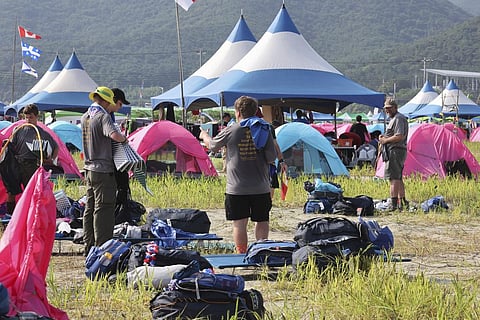

SEOUL: South Korea is preparing to evacuate tens of thousands of scouts from a coastal jamboree site as Tropical Storm Khanun looms, officials said Monday.
Starting Tuesday morning, South Korea will deploy about a thousand buses to pull out some 36,000 scouts from 156 countries from the World Scout Jamboree in the southwestern county of Buan, according to Kim Sung-ho, a vice minister at South Korea’s Ministry of the Interior and Safety.
He said most of the scouts will be accommodated at venues in the country’s capital, Seoul, and the nearby metropolitan area. Officials were trying to secure spaces at government training centres and education facilities. Kim said it would take six hours or more to evacuate the scouts from the campsite, which organizers said will no longer be used for any event after they leave.
The announcement came after The World Organization of the Scout Movement said it urgently called on South Korea to quickly move the scouts from the storm’s path and “provide all necessary resources and support for participants during their stay and until they return to their home countries.”
South Korea’s weather agency reported that Khanun was expected to make landfall in South Korea on Thursday morning, potentially packing winds as strong as 118 to 154 kilometres (73 to 95 miles) per hour. Large swaths of the country’s south, including Buan, could be affected by the storm as early as Wednesday, the agency said.
President Yoon Suk Yeol’s office said he called for “contingency” plans, which could include relocating them to hotels and other facilities in the country’s capital, Seoul, and nearby metropolitan areas. Khanun has taken an unusual, meandering path around Japan’s southwestern islands for more than a week, dumping heavy rain, knocking out power to thousands of homes and disrupting flights and train services. On Monday afternoon, it had sustained winds of 108 kilometres (67 miles) per hour, with higher gusts, and was forecast to maintain that strength as it brushed Japan’s main island of Kyushu this week, the Japan Meteorological Agency said.
The agency said the storm was at about 160 kilometres (99 miles) east of Amami city on Japan’s southern main island of Kyushu and moving gradually toward the north as of Monday afternoon. It warned residents in affected regions to watch out for mudslides, high winds and rough seas.
The storm has caused one death and 70 injuries on the southern Japanese island of Okinawa, according to the country’s Fire and Disaster Management Agency. Due to the forecast of harsh weather in the region, West Japan Railway Co. said there was a possibility of suspending “Shinkansen” bullet train services from Wednesday night to Thursday morning.
Hot temperatures have already forced thousands of British and American scouts to leave the site, which is made on land reclaimed from the sea. Hundreds of participants had been treated for heat-related ailments since the jamboree started on Wednesday. Long before the event’s start, critics raised concerns about bringing such large numbers of young people to a vast, treeless area lacking protection from the summer heat.
Organizers earlier on Monday were scurrying to come up with plans to evacuate the scouts ahead of the storm’s arrival. Choi Chang-haeng, secretary-general of the jamboree’s organizing committee, said organizers have secured more than 340 evacuation venues, including community centers and gyms, in regions near Buan.
About 40,000 scouts — mostly teenagers — from 158 countries came to the jamboree, built on land reclaimed from the sea. About 4,500 were from the U.K., representing the largest national contingent, while about 1,000 were from the United States.
South Korea categorizes Khanun as a typhoon, defined as a tropical storm with winds stronger than 61 kilometres (38 miles) per hour. South Korea’s weather agency expects Khanun to weaken to a storm within the next five days.